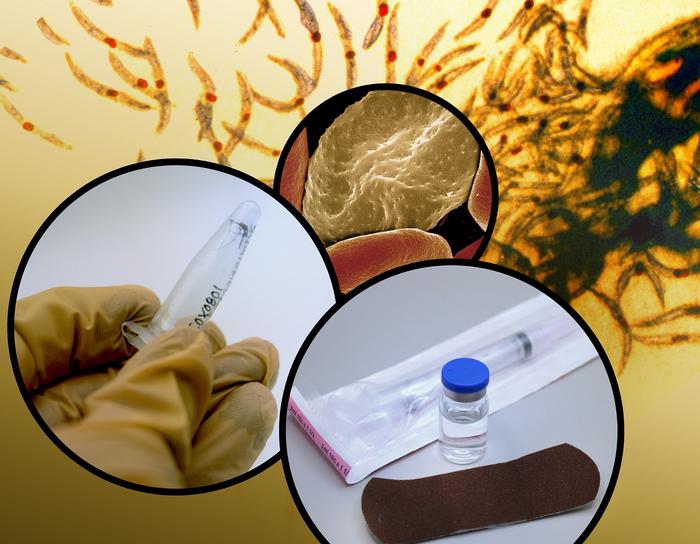WHAT:
Two National Institutes of Health (NIH)-supported trials of an experimental malaria vaccine in healthy Malian adults found that all three tested regimens were safe. One of the trials enrolled 300 healthy women ages 18 to 38 years who anticipated becoming pregnant soon after immunization. That trial began with drug treatment to remove malaria parasites, followed by three injections spaced over a month of either saline placebo or the investigational vaccine at one of two dosages. Both dosages of the vaccine candidate conferred a significant degree of protection from parasite infection and clinical malaria that was sustained over a span of two years without the need for a booster dose—a first for any malaria vaccine. In an exploratory analysis of women who conceived during the study, the vaccine significantly protected them from malaria in pregnancy. If confirmed through additional clinical trials, the approach modeled in this study could open improved ways to prevent malaria in pregnancy.

Credit: NIAID
WHAT:
Two National Institutes of Health (NIH)-supported trials of an experimental malaria vaccine in healthy Malian adults found that all three tested regimens were safe. One of the trials enrolled 300 healthy women ages 18 to 38 years who anticipated becoming pregnant soon after immunization. That trial began with drug treatment to remove malaria parasites, followed by three injections spaced over a month of either saline placebo or the investigational vaccine at one of two dosages. Both dosages of the vaccine candidate conferred a significant degree of protection from parasite infection and clinical malaria that was sustained over a span of two years without the need for a booster dose—a first for any malaria vaccine. In an exploratory analysis of women who conceived during the study, the vaccine significantly protected them from malaria in pregnancy. If confirmed through additional clinical trials, the approach modeled in this study could open improved ways to prevent malaria in pregnancy.
Spread by Anopheles mosquitoes, malaria parasites, including those of the species Plasmodium falciparum (Pf), can cause illness in people of any age. However, pregnant women, infants and very young children are especially vulnerable to life-threatening disease. Malarial parasitemia in pregnancy is estimated to cause up to 50,000 maternal deaths and 200,000 stillbirths in Africa each year.
The trials were co-led by investigators from the NIH’s National Institute of Allergy and Infectious Diseases (NIAID) and the University of Sciences, Techniques and Technologies, Bamako (USTTB), Mali. The investigational vaccine used in both trials was PfSPZ Vaccine, a radiation-attenuated vaccine based on Pf sporozoites (a stage of the parasite’s lifecycle), manufactured by Sanaria Inc., Rockville, Maryland. Multiple previous clinical trials of PfSPZ Vaccine have shown it to be safe, including in malaria-endemic countries such as Mali. In results published in 2022, for example, an NIAID-sponsored, placebo-controlled trial of a three-dose regimen of PfSPZ Vaccine in Burkina Faso found that the vaccine had up to 46% efficacy that lasted at least 18 months.
In the first year of the current trial, 55 women became pregnant within 24 weeks of the third vaccine dose. Among these women, vaccine efficacy against parasitemia (whether before or during pregnancy) was 65% in those who received the lower dose vaccine and 86% in those who received the higher dose. Among 155 women who became pregnant across both study years, vaccine efficacy was 57% for those who received lower dose vaccine and 49% in those in the higher dosage group.
Women who received the investigational vaccine at either of the dosages conceived sooner than those who received placebo, although this finding did not reach the level of statistical significance, reported the investigators. The researchers speculate that the PfSPZ Vaccine might avert malaria-related early pregnancy losses since parasitemia risk during the periconception period was reduced by 65 to 86%.
“Preconception immunization is a new strategy to reduce mortality for women with malaria in pregnancy,” the researchers note. They plan to investigate the safety of PfSPZ Vaccine administered during pregnancy, then examine the efficacy of PfSPZ given preconception or during pregnancy in larger clinical trials. “Existing measures are not protecting women from malaria in pregnancy,” they added. “A safe and effective vaccine is urgently needed, and our results indicate PfSPZ Vaccine might be a suitable candidate,” they conclude.
The PfSPZ Vaccine Study Team was led by Alassane Dicko, M.D., of the Malaria Research and Training Center (MRTC), USTTB, Mali, Stephen L. Hoffman, M.D., of Sanaria Inc., and Patrick E. Duffy, M.D., of the NIAID Laboratory of Malaria Immunology and Vaccinology. Joint co-first authors were Halimatou Diawara, M.D., of MRTC, and Sara A. Healy, M.D., NIAID.
Additional information about the trials is available at clinicaltrials.gov using the identifiers NCT03510481 or NCT03989102.
ARTICLE:
H Diawara et al. Safety and efficacy of PfSPZ Vaccine against malaria in healthy adults and women anticipating pregnancy in Mali: two randomised, double-blind, placebo-controlled, phase 1 and 2 trials. Lancet Infectious Diseases DOI: 10.1016/ S1473-3099(24)00360-8 (2024).
WHO:
Patrick E. Duffy, M.D., Chief, Laboratory of Malaria Immunology and Vaccinology, NIAID, is available to comment.
CONTACT:
To schedule interviews, please contact Anne A. Oplinger, (301) 402-1663, niaidnews@niaid.nih.gov.
NIAID conducts and supports research—at NIH, throughout the United States, and worldwide—to study the causes of infectious and immune-mediated diseases, and to develop better means of preventing, diagnosing and treating these illnesses. News releases, fact sheets and other NIAID-related materials are available on the NIAID website.
About the National Institutes of Health (NIH): NIH, the nation’s medical research agency, includes 27 Institutes and Centers and is a component of the U.S. Department of Health and Human Services. NIH is the primary federal agency conducting and supporting basic, clinical, and translational medical research, and is investigating the causes, treatments, and cures for both common and rare diseases. For more information about NIH and its programs, visit
NIH…Turning Discovery Into Health®
Journal
The Lancet Infectious Diseases



